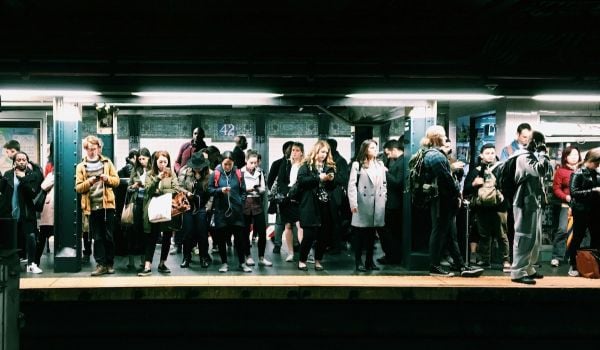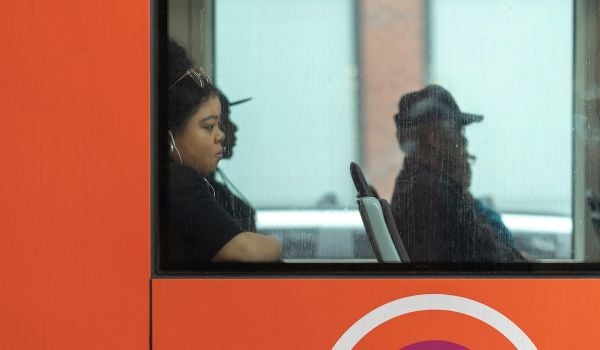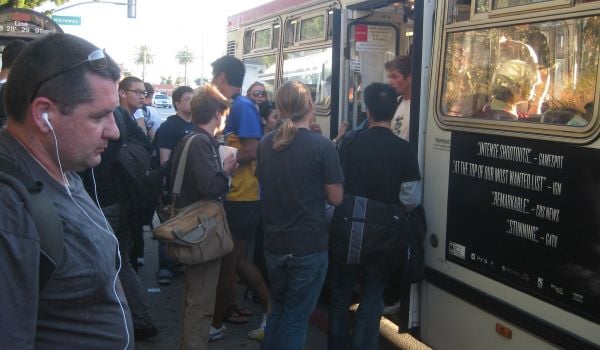Canadian cities, like those in the U.S., have traditionally been run as representative democracies, in which voters elect politicians who then carry out their mandates. But sometimes, politicians either don’t know the wishes of their constituents or don’t want to take a stance on a controversial issue. So they’ll throw the issue back to the citizenry in the form of a referendum.
In Vancouver and its surrounding cities, transit has apparently become one of those let-the-voters-decide issues. British Columbia Premier Christy Clark, of the center-right BC Liberals (Canada has a somewhat confusing, though perhaps more efficient, system of political parties whereby those at the municipal, provincial and national levels don’t always align), has called for a referendum on transit spending, with two new projects taking center stage.
A $3 billion expansion of SkyTrain, an elevated driverless metro system, would serve Vancouver’s Broadway corridor, anchored by the University of British Columbia and home to North America’s busiest bus route. (It carries 110,000 rides per day, besting buses on Manhattan’s First and Second avenues.) If transit were doled out by merit, the Broadway-UBC corridor would have gotten a SkyTrain line before the Evergreen Line in nearby Burnaby, Port Moody and Coquitlam.
Just southeast of Vancouver, the city of Surrey is looking for approximately $2 billion for a three-line light rail system. TransLink, the regional transit coordinating body, wanted to build a SkyTrain line in Surrey, but the city of about 468,000 said that it would prefer three light rail lines to one metro line.
The transit referendum has, however, stirred some resentment among advocates. Gordon Price, an urban planner and former city councillor from Vancouver, has the harshest take on the proposed vote:
[Simon Fraser University] City Program director Gordon Price said a referendum could be a disaster for the region, blocking transit upgrades needed for the livability of the growing region.
“It’s an excruciatingly bad idea,” he said, pointing to transportation funding referenda in U.S. states, where he said good policy is often sacrificed to craft an initiative that might pass.
“It just invites everything to be framed as part of a cynical political exercise that’s put through the grinder of ideology, partisanship and parochialism. It becomes what will sell. Not what’s right or how do we make the tradeoffs that need to be made.”
Price said the move reflects a continuing provincial government bias against transit and in favour of bridge and freeway projects that appeal to drivers but ultimately undercut the aim of more transit use and lower emissions.
“Why is only one part of the transportation system up for a referendum?” Price asked. “I want to vote on the [replacement of the] Massey Tunnel. And why didn’t they do that with the Port Mann Bridge?” ed.: both for cars
Price said he believes the referendum promise is designed so the Liberals can dodge responsibility for whatever deal may be struck with Metro mayors.
Then there are the logistics of the vote: Should it be an up/down vote, or multiple choice? Clark wants to give voters a few options — “how much transit do you want and how do you want to pay for it? How much change do you want or do you want no change to the system at all?” — whereas her Minister of Transport hedged on the question, telling the Globe and Mail that it hasn’t been decided how many options will appear on the ballot.
Despite the misgivings, there are plenty of examples of transit referenda yielding good results, most notably in Switzerland, a country with a long history of direct democracy and taking issues straight to the people. Voters in Zurich, for example, rejected a two-line subway in a 1960 referendum, and then another subway-like plan in the 1970s. It turned out for the best, since politicians reworked the plans into a more cost-effective S-Bahn system. First approved by voters in 1981, the S-Bahn network, which features suburban railways converging on a denser network in the core, has grown in size to encompass more than 20 different lines — something that would’ve been impossible had politicians gone forward with the original subway plan. The Zurich metro area has fewer than 2 million inhabitants.
Stateside, it shouldn’t be forgotten that Measure R in L.A. is responsible for funding a whole plethora of rail projects, from the Expo Line to the Regional Connector, a downtown subway. Though it hasn’t been all roses for L.A.‘s transit votes — Measure J, which would have sped up transit funding, failed last year despite earning 66.11 percent of the vote, leading transit advocates to call for a reconsideration of the two-thirds threshold needed to pass tax increases.
The Works is made possible with the support of the Surdna Foundation.
Stephen J. Smith is a reporter based in New York. He has written about transportation, infrastructure and real estate for a variety of publications including New York Yimby, where he is currently an editor, Next City, City Lab and the New York Observer.

















